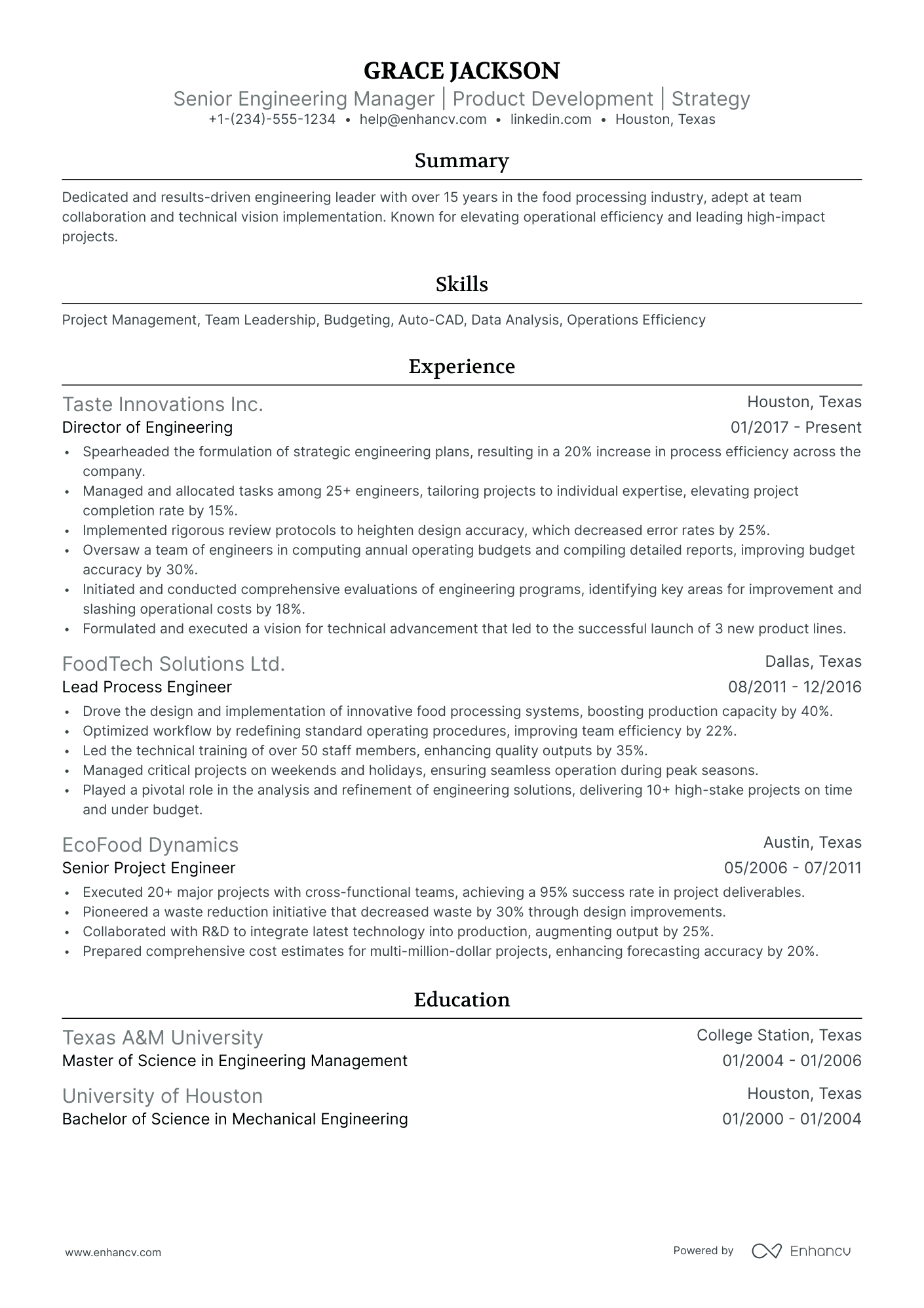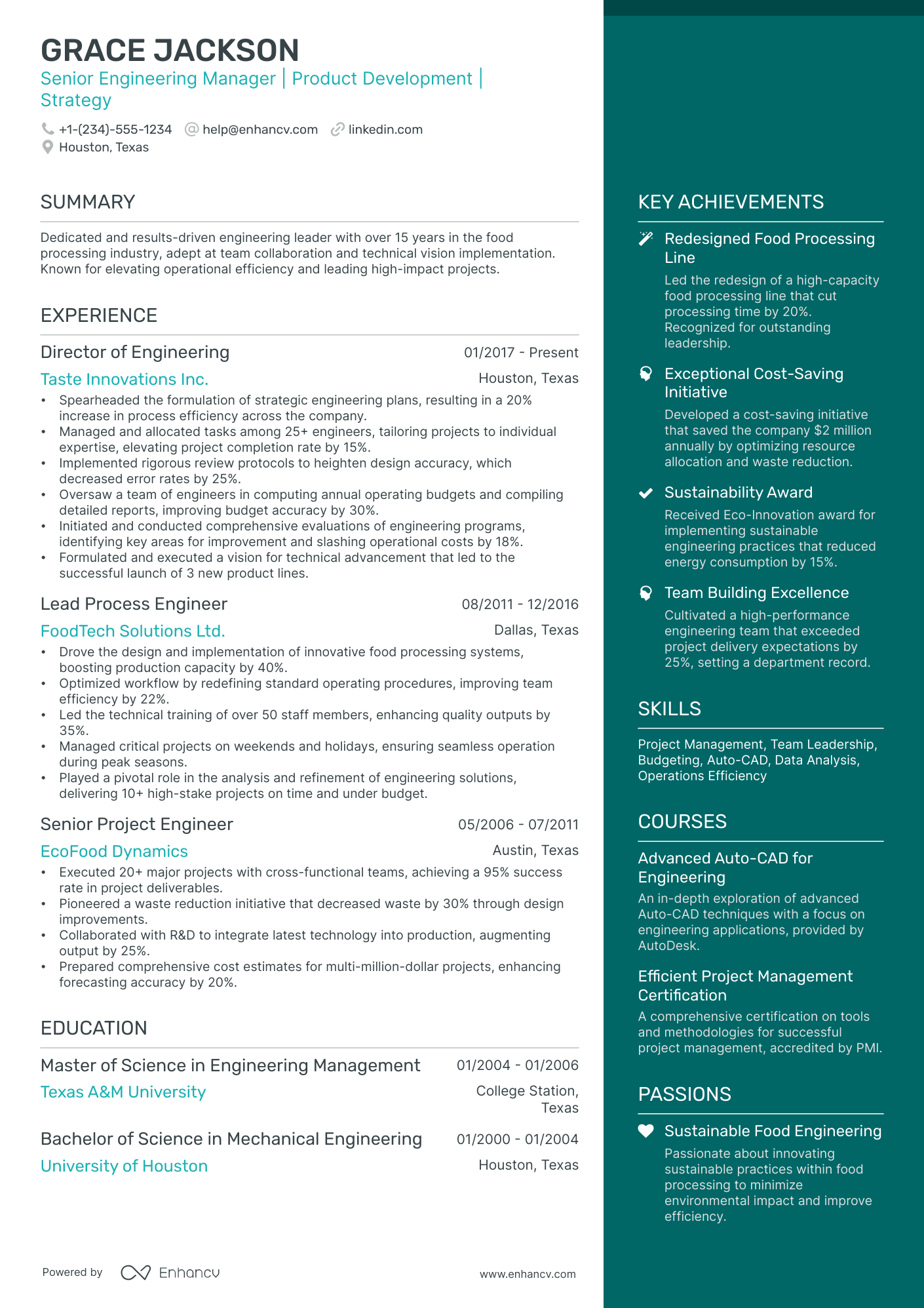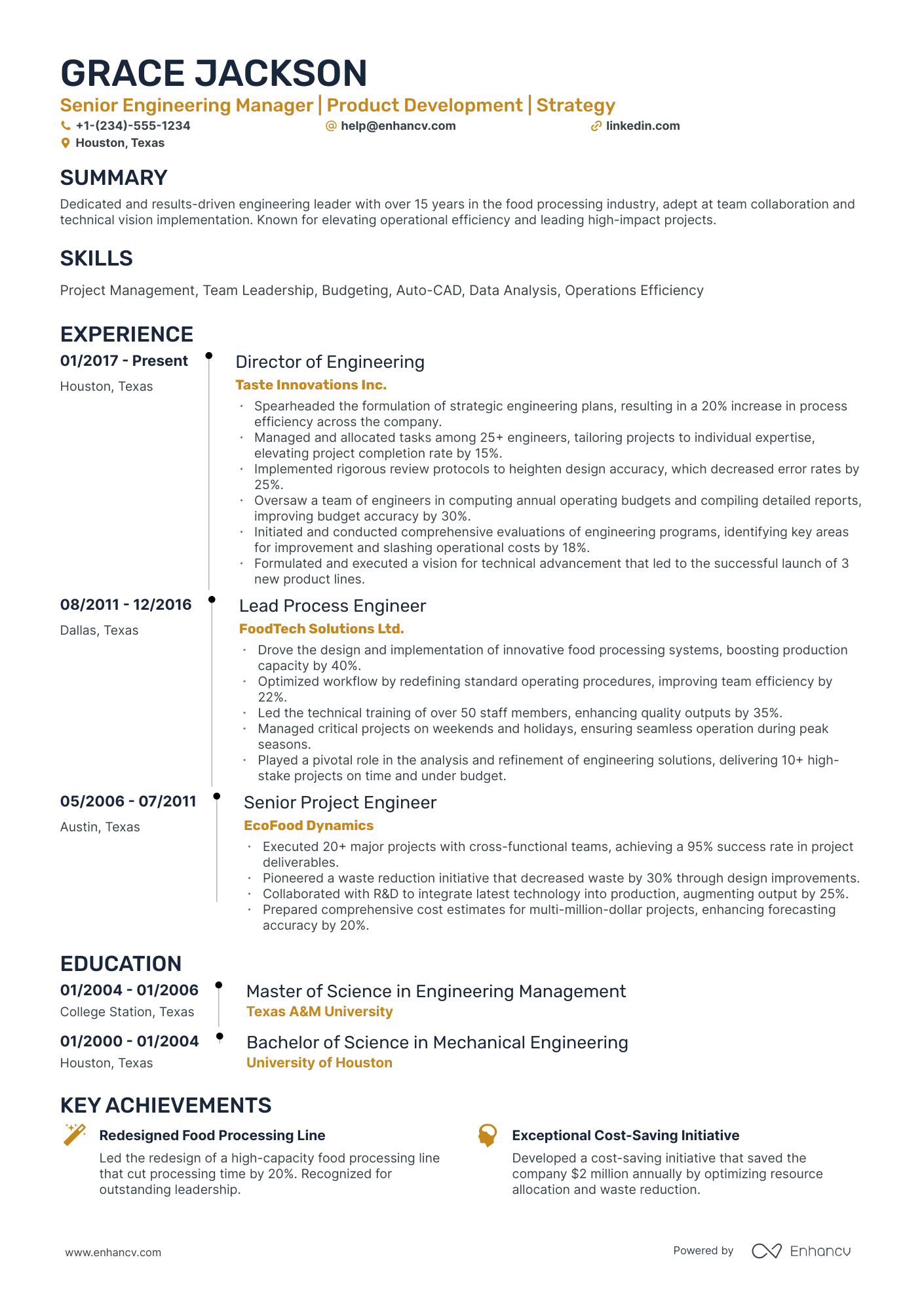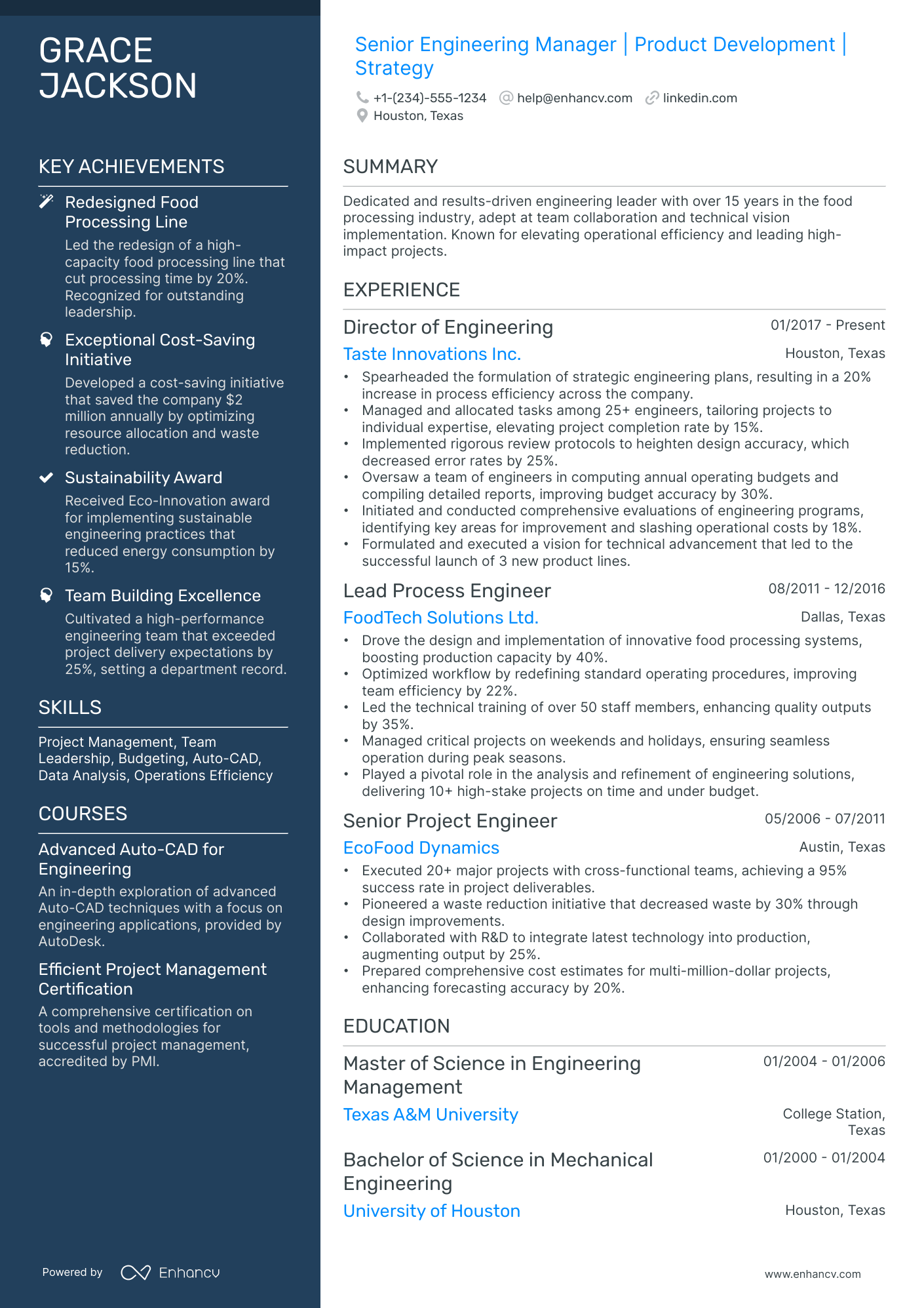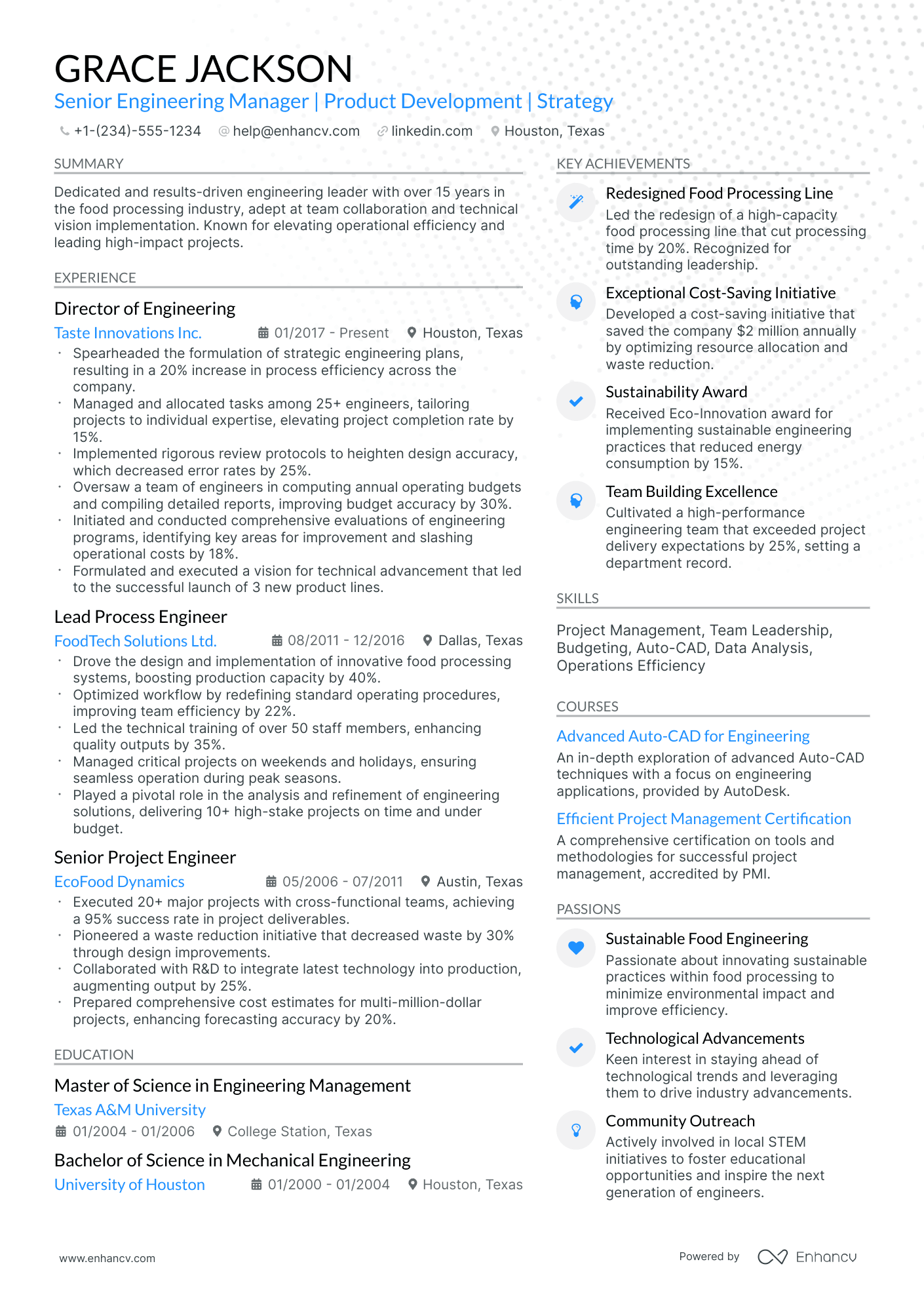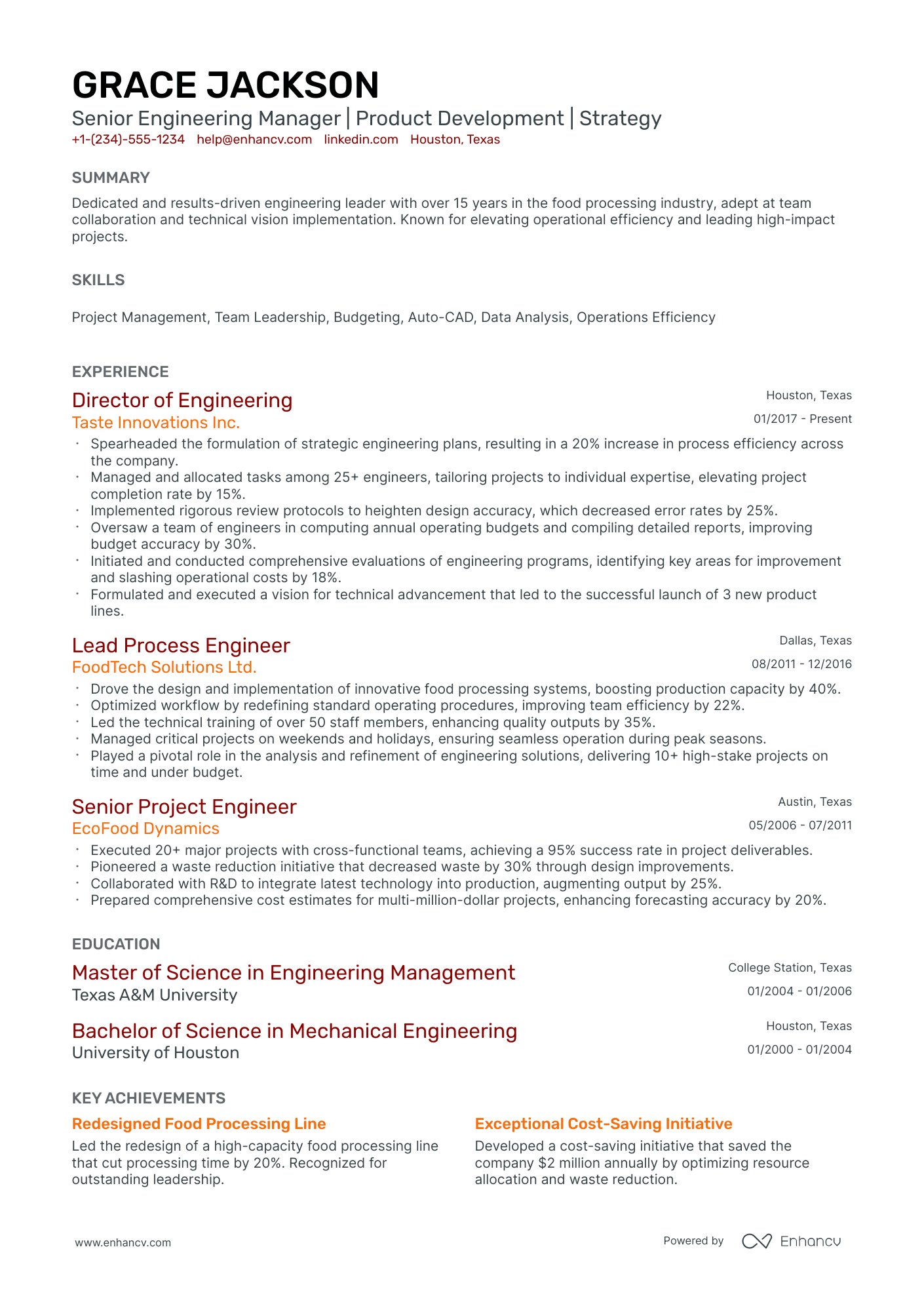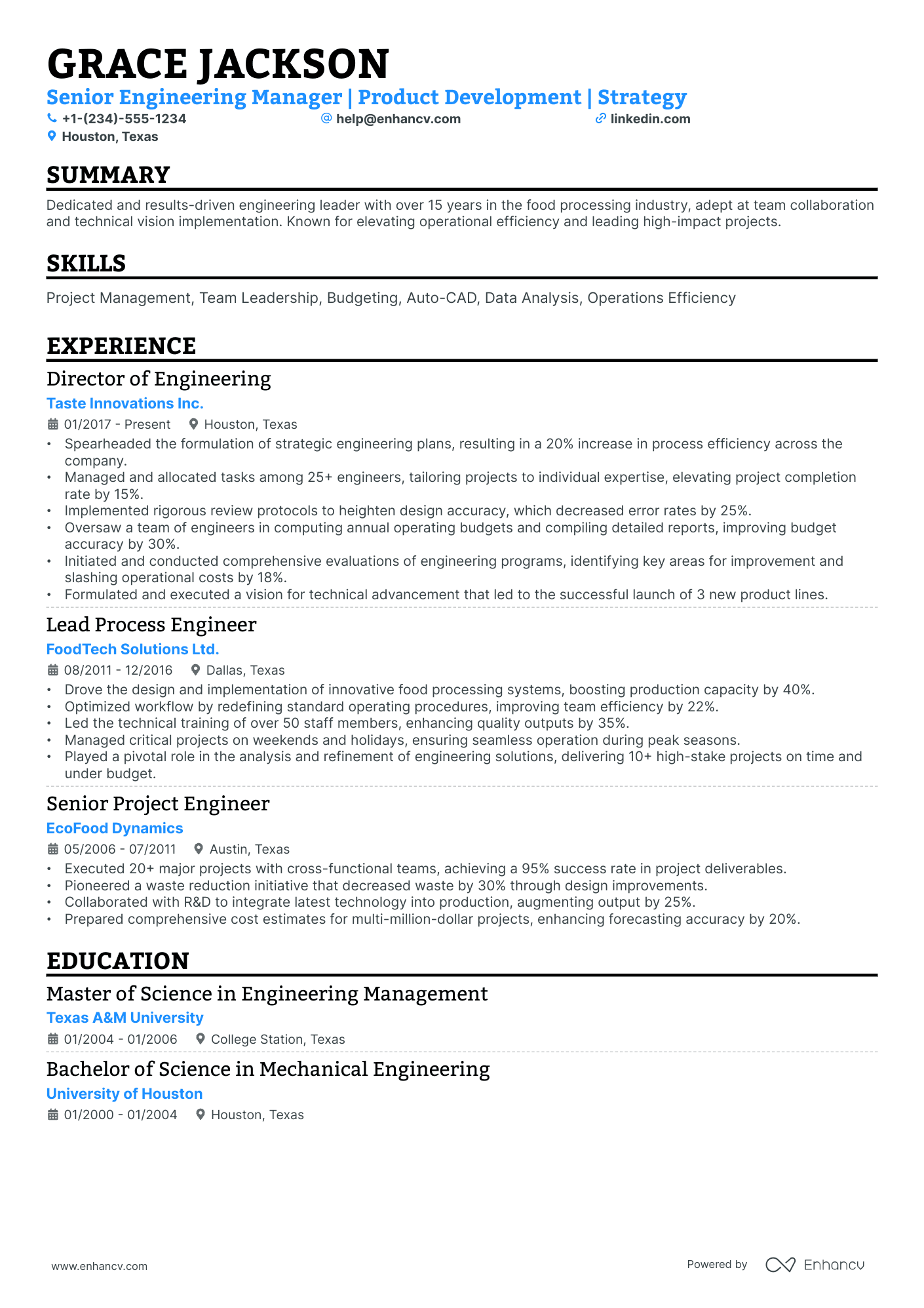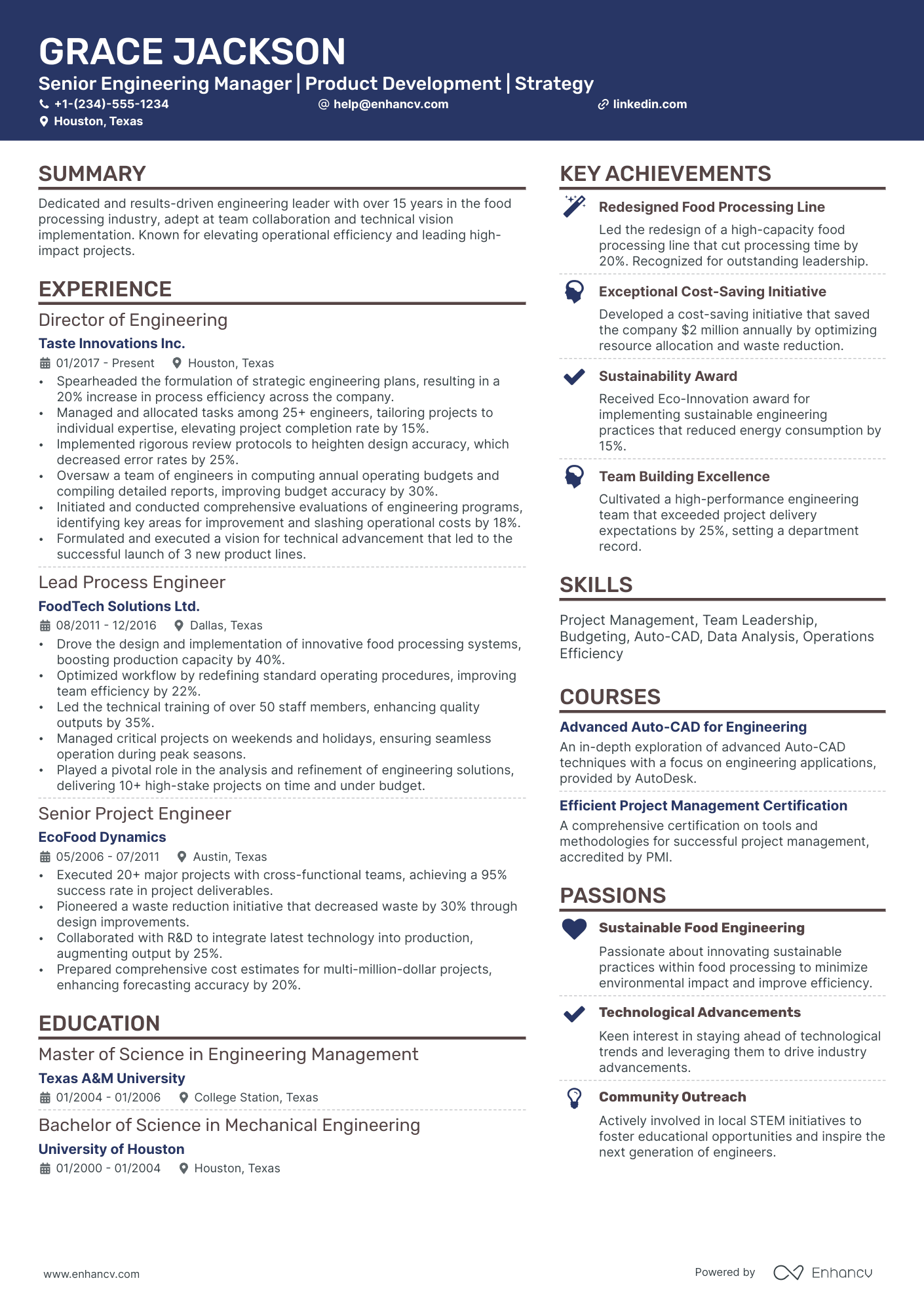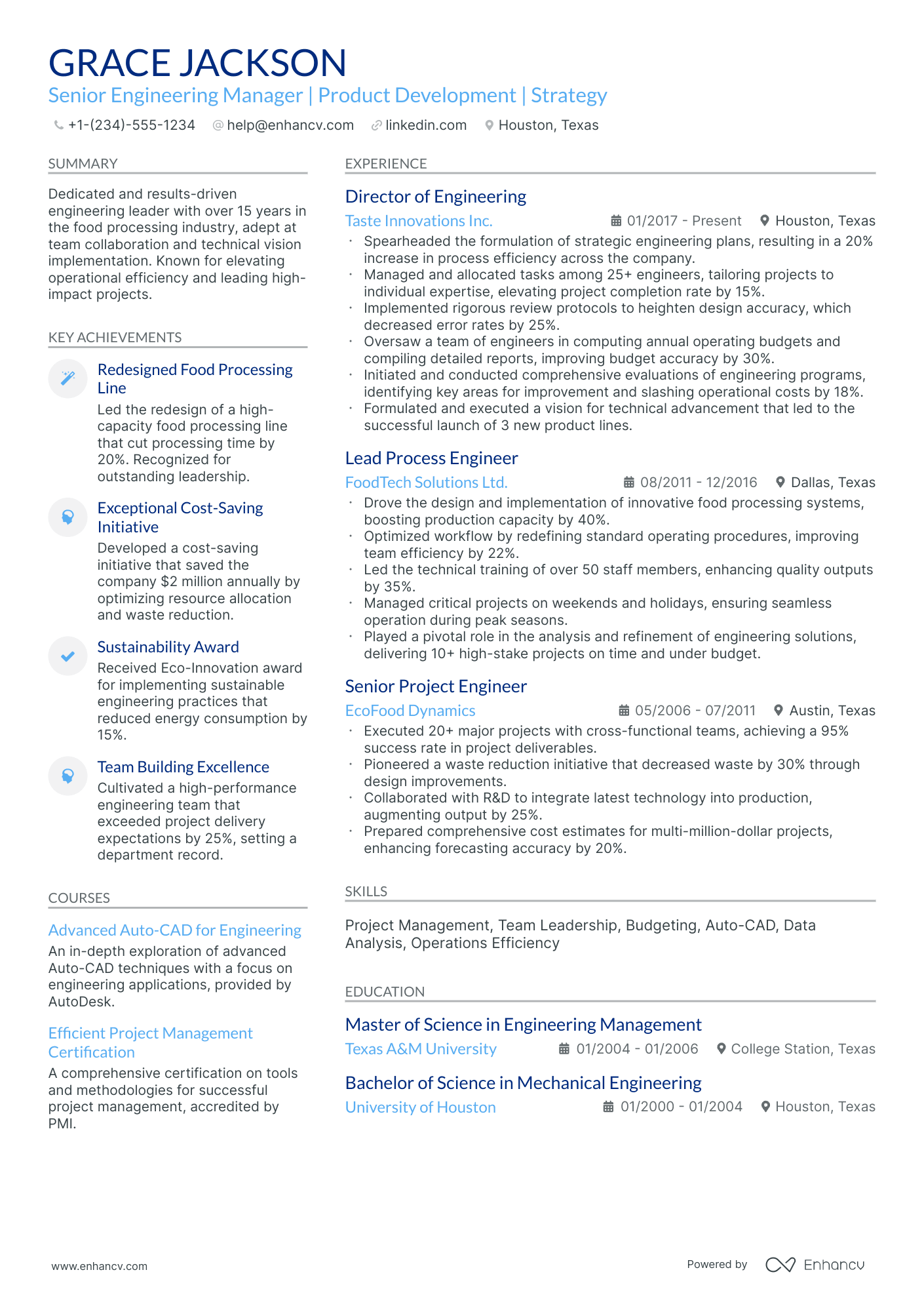As a director of engineering, articulating the depth of your technical expertise while also highlighting your leadership skills can be a daunting resume challenge. Our guide provides targeted advice on how to balance these elements effectively, ensuring your resume showcases both your managerial acumen and engineering proficiency.
- Utilize real-life examples to refine your director of engineering resume;
- Effectively write the experience section of your director of engineering resume, even if you have minimal or no professional experience;
- Incorporate the industry's top 10 essential skills throughout your resume;
- Include your education and certifications to highlight your specific expertise.
If the director of engineering resume isn't the right one for you, take a look at other related guides we have:
- Electrical Manager Resume Example
- Architectural Project Manager Resume Example
- Energy Manager Resume Example
- Geotechnical Engineering Resume Example
- Aerospace Engineering Resume Example
- Electrical Project Manager Resume Example
- Engineering Project Manager Resume Example
- Construction Manager Resume Example
- Construction Worker Resume Example
- Automotive Engineering Resume Example
Is there a correct way to format your director of engineering resume?
This is a tricky question. While skimming over your resume, recruiters will be looking at your experience and the message your profile conveys. That's why your resume format needs to be clear and concise, serving to supplement and organize your experience. Professional best practices point that the best director of engineering resumes:
- Follow the reverse chronological order, where the most recent experience items are presented first . This is to keep your expertise succinct and to show recruiters your career growth over the years;
- Have a clearly defined header that includes all relevant contact information and a portfolio or a LinkedIn link. In some countries, it is acceptable to include a professional photo , so that your application is more memorable;
- Feature the most important director of engineering resume sections towards the top, e.g. summary, skills, and experience. That way, recruiters can immediately find information that is relevant to the role;
- Take up no more than two pages - and two pages are the exception for more experienced professionals. Keep your expertise to the point and use your director of engineering resume real estate wisely .
- Selecting modern, yet simple fonts, e.g. Rubik, Lato, etc., would help your application stand out;
- Many candidates stick with the tried-and-tested Arial or Times New Roman, but you'd want your director of engineering resume to be a bit more unique;
- The ATS can read all serif and sans-serif fonts, so you should avoid fancy, formal script (or cursive) fonts.
Keep in mind the market you’re applying to – a Canadian resume, for instance, might have a unique layout.
Upload & Check Your Resume
Drop your resume here or choose a file. PDF & DOCX only. Max 2MB file size.
PRO TIP
If you happen to have some basic certificates, don't invest too much of your director of engineering resume real estate in them. Instead, list them within the skills section or as part of your relevant experience. This way you'd ensure you meet all job requirements while dedicating your certificates to only the most in-demand certification across the industry.
Fundamental sections for your director of engineering resume:
- The header with your name (if your degree or certification is impressive, you can add the title as a follow up to your name), contact details, portfolio link, and headline
- The summary or objective aligning your career and resume achievements with the role
- The experience section to curate neatly organized bullets with your tangible at-work-success
- Skills listed through various sections of your resume and within an exclusive sidebar
- The education and certifications for more credibility and industry-wide expertise
What recruiters want to see on your resume:
- Proven leadership and team management skills, with experience in overseeing multiple engineering projects and teams.
- Strong technical proficiency and a solid understanding of the engineering discipline relevant to the company's industry (e.g., software, mechanical, electrical).
- Exceptional project management abilities, including track record of delivering complex projects on time and within budget.
- Experience in strategic planning and execution, including technology road-mapping and resource allocation optimization.
- Demonstrated ability to drive innovation and continuous improvement in engineering processes and product development.
Adding your relevant experience to your director of engineering resume
If you're looking for a way to show recruiters that your expertise is credible, look no further than the resume experience section.
Your director of engineering resume experience can be best curated in a structured, bulleted list detailing the particulars of your career:
- Always integrate metrics of success - what did you actually achieve in the role?
- Scan the director of engineering advert for your dream role in search of keywords in the job requirements - feature those all through your past/current experience;
- Dedicate a bullet (or two) to spotlight your technical capabilities and how you're able to use the particular software/technology in your day-to-day roles;
- Write simple by including your responsibility, a job advert keyword or skill, and a tangible outcome of your success;
- Use the experience section to also define the unique value of working with you in the form of soft skills, relevant feedback, and the company culture you best thrive in.
Industry leaders always ensure that their resume experience section offers an enticing glimpse at their expertise, while telling a career narrative. Explore these sample director of engineering resumes on how to best create your resume experience section.
- Led the engineering division in developing an innovative, market-disrupting product, overseeing a 40% growth in product offerings over a 5-year period.
- Managed the optimization of product development operations, reducing time-to-market by 15% and accelerating customer feedback loop integration.
- Fostered a culture of continuous improvement and strategic innovation, orchestrating a realignment that enhanced interdisciplinary collaboration and increased project success rates by 22%.
- Oversaw a cross-functional team of 100+ engineers, achieving a milestone in developing a patented AI-driven analysis tool that improved system efficiencies by 35%.
- Implemented a comprehensive project management strategy that improved on-time delivery of engineering projects by 40%.
- Drove the successful acquisition and integration of a smaller competitor's technology stack, expanding our R&D capabilities and market reach.
- Championed the development and launch of a flagship SaaS product, resulting in a $50M revenue increase and establishing the company as a leader in the space.
- Spearheaded the revamp of the quality assurance process, achieving a 97% customer satisfaction rate and a 25% reduction in post-launch defects.
- Established a mentorship program to develop upcoming engineering leaders, enhancing team capabilities and contributing to a 30% increase in staff retention.
- Empowered the engineering team to meet ambitious deadlines, delivering a critical infrastructure project that increased operational capacity by 50%.
- Developed strategic partnerships with vendors, improving supply chain efficiency by 20% and resulting in a cost saving of $5M annually.
- Implemented an agile development framework that improved cross-functional collaboration and cut down project turnaround time by 30%.
- Directed the end-to-end execution of an international expansion project, facilitating the company's growth into three new markets.
- Led a ground-breaking initiative to migrate core services to the cloud, enhancing system scalability and reducing downtime by 95%.
- Initiated a successful cost-reduction program that trimmed engineering expenses by 25% without compromising on innovation or quality.
- Revitalized the company's mobile platform strategy, driving the development of an award-winning app which led to a 60% increase in mobile user engagement.
- Launched a diversity initiative that not only enriched the team's skills but also resulted in a 20% increase in female engineer hires over a two-year period.
- Navigated complex stakeholder relationships to prioritize projects aligning with business goals, securing an average annual product development budget of $30M.
- Pioneered the adoption of IoT technologies, integrating smart systems into products that enhanced the user experience and generated a 45% uptick in customer satisfaction ratings.
- Negotiated and managed outsourcing contracts, streamlining resource allocation and cutting operational costs by 18% while maintaining quality standards.
- Developed a modular design principle framework, enabling a 20% faster go-to-market for new product lines and flexible product customization options for clients.
- Championed a company-wide digital transformation initiative that automated processes and leveraged data analytics, resulting in improved decision-making and a 30% gain in operational efficiency.
- Cultivated high-performance teams that were critical in securing ISO 9001 certification for the company, setting a benchmark for quality management standards.
- Instrumental in negotiating key strategic partnerships that expanded the engineering services portfolio and increased yearly revenues by 25%.
Quantifying impact on your resume
- Include the total budget you managed for engineering projects, demonstrating your financial oversight abilities.
- List specific percentages by which you have reduced operational costs through efficiency improvements.
- Highlight the number of cross-functional teams you've led, reflecting your leadership scope.
- Mention the exact number of patents your engineering team has filed under your guidance to showcase innovation.
- Indicate the number of products or features successfully delivered to the market to emphasize project completion rates.
- State the measurable scale of engineering systems you've developed or optimized, demonstrating impact on infrastructure.
- Report the quantifiable improvement in key performance indicators (KPIs) such as system uptime or reliability during your tenure.
- Detail the percentage increase in team productivity or project delivery speed as a result of process improvements you instituted.
Action verbs for your director of engineering resume
No relevant experience - what to feature instead
Suppose you're new to the job market or considering a switch in industry or niche. In such cases, it's common to have limited standard professional experience. However, this isn't a cause for concern. You can still craft an impressive director of engineering resume by emphasizing other sections, showing why you're a great fit for the role:
- Emphasize your educational background and extracurricular activities to demonstrate your industry knowledge;
- Replace the typical experience section with internships or temporary jobs where you've gained relevant skills and expertise;
- Highlight your unique skill set, encompassing both technological and personal abilities;
- Showcase transferable skills acquired throughout your life and work experiences so far.
Recommended reads:
PRO TIP
If you happen to have some basic certificates, don't invest too much of your director of engineering resume real estate in them. Instead, list them within the skills section or as part of your relevant experience. This way you'd ensure you meet all job requirements while dedicating your certificates to only the most in-demand certification across the industry.
In-demand hard skills and soft skills for your director of engineering resume
A vital element for any director of engineering resume is the presentation of your skill set.
Recruiters always take the time to assess your:
- Technological proficiency or hard skills - which software and technologies can you use and at what level?
- People/personal or soft skills - how apt are you at communicating your ideas across effectively? Are you resilient to change?
The ideal candidate presents the perfect balance of hard skills and soft skills all through the resume, but more particular within a dedicated skills section.
Building your director of engineering skills section, you should:
- List up to six skills that answer the requirements and are unique to your expertise.
- Include a soft skill (or two) that defines you as a person and professional - perhaps looking back on feedback you've received from previous managers, etc.
- Create up to two skills sections that are organized based on the types of skills you list (e.g. "technical skills", "soft skills", "director of engineering skills", etc.).
- If you happen to have technical certifications that are vital to the industry and really impressive, include their names within your skills section.
At times, it really is frustrating to think back on all the skills you possess and discover the best way to communicate them across.
We understand this challenge - that's why we've prepared two lists (of hard skills and soft skills) to help you build your next resume, quicker and more efficiently:
Top skills for your director of engineering resume:
Software Development Life Cycle (SDLC)
Agile Methodologies
Project Management Tools (e.g., Jira, Trello)
Cloud Computing (e.g., AWS, Azure, GCP)
DevOps Practices and Tools (e.g., Docker, Kubernetes)
Architecture Design and Frameworks
Programming Languages (e.g., Java, Python, C#)
CI/CD Pipeline Implementation
Database Management Systems (e.g., SQL, NoSQL)
Version Control Systems (e.g., Git)
Leadership
Strategic Thinking
Communication
Problem Solving
Team Collaboration
Conflict Resolution
Time Management
Adaptability
Mentoring and Coaching
Decision Making
PRO TIP
List your educational qualifications and certifications in reverse chronological order.
Maximizing your director of engineering resume: education and certification sections
To effectively showcase your industry knowledge in your director of engineering resume, it's important to properly list your education and certifications.
For the education section, ensure you include:
- Higher education degrees pertinent to the industry or those at a postgraduate level;
- The start and end dates of your education, along with the name of the institution you graduated from;
- Your GPA and relevant coursework, but only if they are impressive and applicable to the role.
Additionally, create a separate certifications section to spotlight your most notable recognitions. Another excellent place to feature a leading industry certificate is in your resume header, right after your name.
Below is a list of key industry certifications that are often sought after by recruiters
The top 5 certifications for your director of engineering resume:
- Project Management Professional (PMP) - Project Management Institute
- Certified ScrumMaster (CSM) - Scrum Alliance
- Professional Engineer (PE) - National Society of Professional Engineers
- Certified Engineering Manager (CEM) - American Society for Engineering Management
- Lean Six Sigma Green Belt (LSSGB) - American Society for Quality
PRO TIP
Mention specific courses or projects that are pertinent to the job you're applying for.
Recommended reads:
Should you write a resume summary or an objective?
No need to research social media or ask ChatGPT to find out if the summary or objective is right for your director of engineering resume.
- Experienced candidates always tend to go for resume summaries. The summary is a three to five sentence long paragraph that narrates your career highlights and aligns your experience to the role. In it you can add your top skills and career achievements that are most impressive.
- Junior professionals or those making a career change, should write a resume objective. These shouldn't be longer than five sentences and should detail your career goals . Basically, how you see yourself growing in the current position and how would your experience or skill set could help out your potential employers.
Think of both the resume summary and objective as your opportunity to put your best foot forward - from the get go - answering job requirements with skills.
Use the below real-world director of engineering professional statements as inspiration for writing your resume summary or objective.
Resume summaries for a director of engineering job
- With over 18 years of experience leading software engineering teams, this seasoned professional has successfully launched multiple SaaS products, resulting in a 70% market share increase. Expert in Agile methodologies and cloud computing, their leadership in migrating legacy systems has elevated operational efficiency by 40% at a global tech firm.
- A strategic innovator with 15 years in hardware engineering, managing R&D departments for Fortune 500 companies. They have driven the development of cutting-edge IoT solutions, yielding a 200% ROI and securing 5 industry awards for technological excellence. Mastery in electromechanical systems and lean manufacturing principles stands them apart in driving engineering team performance.
- Transitioning from a senior role in aerospace project management to engineering leadership, this individual brings a unique perspective with 12 years of experience. Their work on the Mars Rover project highlights skills in systems engineering and cross-disciplinary collaboration, positioning them well to lead advanced engineering projects with a focus on delivering reliable and robust systems.
- Former Chief Architect of renewable energy systems seeking to pivot into engineering management, offering over 16 years of experience in sustainable design and integration. The candidate has a proven track record of optimizing energy use in large-scale operations, including the deployment of a solar grid that powers 20,000 homes, amplifying community impact and operational sustainability.
- Seeking to leverage a recent Master's in Engineering Management and a passion for robotics, this applicant aims to contribute to a team where dynamic leadership and analytical skills can support the delivery of high-quality engineering solutions. Keen to apply advanced theoretical knowledge in a practical setting, aligning emerging technologies with strategic goals to drive innovation and growth.
- Adept at learning and eager to apply an enthusiastic approach to problem-solving, this entry-level candidate aspires to facilitate engineering processes while honing technical and project management skills. With a Bachelor's in Mechanical Engineering and internships focusing on product development, they are prepared to contribute effectively to engineering projects and team dynamics.
Optimize your resume summary and objective for ATS
Drop your resume here or choose a file.
PDF & DOCX only. Max 2MB file size.
Taking your director of engineering resume to the next level with these four additional resume sections
Your director of engineering resume can feature a variety of skills (both hard and soft) in diverse sections. Choose those that align best with the job requirements and reflect your suitability for the company culture.
Consider these four additional resume sections recommended by our experts:
- Languages - State any languages you are proficient in and your level of proficiency. This demonstrates your commitment to communication and potential for international growth.
- Projects - Highlight up to three significant projects you've completed outside of work, showcasing skill development. Include a link to your project portfolio in the director of engineering resume header, if applicable.
- My Time - How you allocate your time outside work can indicate your organizational skills and cultural fit within the company.
- Volunteering - Detail causes you're passionate about, roles you've held, and achievements in volunteering. Such experiences likely have honed a range of soft skills crucial for your dream job.
Key takeaways
We've reached the end of our director of engineering resume guide and hope this information has been useful. As a summary of our key points:
- Always assess the job advert for relevant requirements and integrate those buzzwords across various sections of your director of engineering resume by presenting tangible metrics of success;
- Quantify your hard skills in your certificates and skills section, while your soft skills in your resume achievements section;
- Ensure you've added additional relevant experience items, such as extracurricular activities and projects you've participated in or led;
- Use both your resume experience and summary to focus on what matters the most to the role: including your technical, character, and cultural fit for the company.
